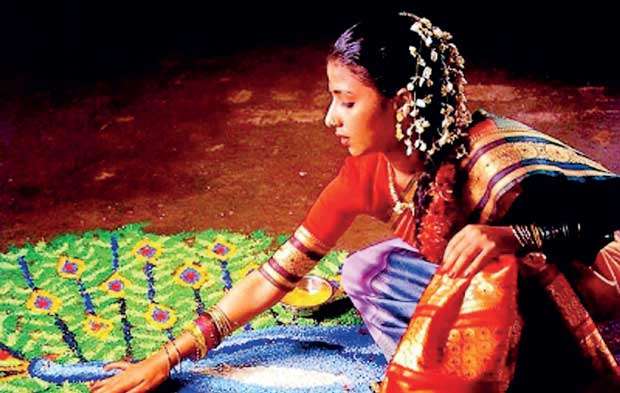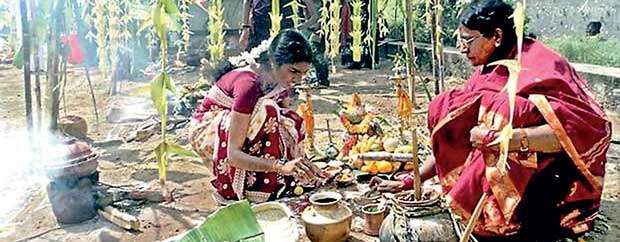15 Jan 2019 - {{hitsCtrl.values.hits}}
Taking a fresh look at the times and context of the Pongal festival

 Can the boiling-over the ‘standardised-pasteurized’ milk on a corner of an apartment on a gas stove be considered Thai Pongal in its strictest meaning remains a troubling question for us today.
Can the boiling-over the ‘standardised-pasteurized’ milk on a corner of an apartment on a gas stove be considered Thai Pongal in its strictest meaning remains a troubling question for us today.
The Pongal sweet rice thus made is offered to the sun that beats down through the high rise window. You are lucky if you have an east-facing window.
One may argue that the festival should be celebrated as a ritual to keep alive the Tamil traditions-of course, a valid argument.
The Tamil festival of Thai Pongal is essentially a harvest festival, may be originating from the times when man started tilling land and settling down along river banks and fertile soils. Some historians trace harvest festivals to as far back as 5,000 years. Similar harvest festivals are found in almost all cultures across the world being a pastoral-agricultural festivals.
However, among Tamils across the world even today, Thai Pongal is celebrated. However, the festival that is celebrated today (that is January 15, 2019), is predominantly a Tamil cultural festival based on Tamil calendar system marking the first day of the Tamil month of Thai dedicated to the sun.
It is celebrated four-days annually in accordance with the Tamil calendar. According to the Gregorian calendar, the dates range from January 14 to January 17.
“The day also marks the start of the sun’s six-month-long journey northwards (the Uttaraayanam). This also corresponds to the Indic solstice, when the sun purportedly enters the 10th house of the Indian zodiac Makara or Capricorn. Thai Pongal is mainly celebrated to convey appreciation to the sun for a successful harvest. Part of the celebration is the boiling of the first rice of the season consecrated to the sun,” says Wikipedia entry on Pongal.
Apart from ‘Thai’ Pongal, Tamils in Sri Lanka and elsewhere, also celebrate innumerable other ‘Pongal’ festivals-as each Temple has its own Pongal festival, while each deity of the 30x30,000,000 members of the Hindu pantheon. Hence Thai Pongal is just another festival but with stress on agriculture.
The thrust if this article is not to write ad nauseam of the history or other ‘religious aspects’ of the festival. The festival, however, remains a cause for us to remember that the sun is in the centre of our lives-whatever the argument is and by extension- that man needs nature for humanity’s survival and not the other way around.
On the other hand, we are also compelled to question how relevant the festival is in today’s urban lifestyle. In the cities as well as in the rural areas, where too the industrialised, salaried lifestyle has become the norm, pushing the cultivator to the margins?
For the farmer, it is a sort of spontaneous overflow of joy as the mellowed grains come home. It’s starting afresh with Bhogi Pongal (Yesterday) where he discarded and burnt all that is past
In fact, as farming-pastoral communities dwindle, it is mainly the urban salaried middle-classes and others who now celebrate Thai Pongal most, despite their disconnect to the soil and animals- a disconnect from nature itself.
It is also important to these classes to remember that numerous farmers commit suicide unable to pay back corporate credits. Look up Farmer Suicides in India on Wikipedia for more information.
The question is, are we conscious about the desperation of many farmers when we boil-over milk and sweeten it with rice and jaggery that is bought in the shop or the super groceries?
The farmer has a genuine reason to celebrate when he brings the freshly harvested rice and then show his gratitude towards the sun and the cattle that helped him in his endeavour. Do middlemen and salarymen have any reason to celebrate is the essential question we need to search for?

For the farmer, it is a sort of spontaneous overflow of joy as the mellowed grains come home. It’s starting afresh with Bhogi Pongal (Yesterday) where he discarded and burnt all that is past. Today the Sri Lanka Tamil society is fragmented with families scattered all over in the economic West, hardly having any harmony with the pastoral agricultural life it once had decades ago. A dispersal of sorts. However, the Tamil Nadu context is different.
With fewer relatives living in close proximities (What Kaanum Pongal?), dysfunctional families and even fewer engaged in agriculture, the gap between the festival and people seems to be widening. Just a sort of ritual that has lost the root causes of its beginnings.
For the Thai Pongal to be a great festival, we need to go back to the fields with dignity.
All this was a long time ago, I remember, and I would do like to celebrate again, wonder if we were led all that way for birth or death? There was death certainly.
30 Nov 2024 1 hours ago
30 Nov 2024 3 hours ago
30 Nov 2024 6 hours ago
30 Nov 2024 7 hours ago
29 Nov 2024 29 Nov 2024